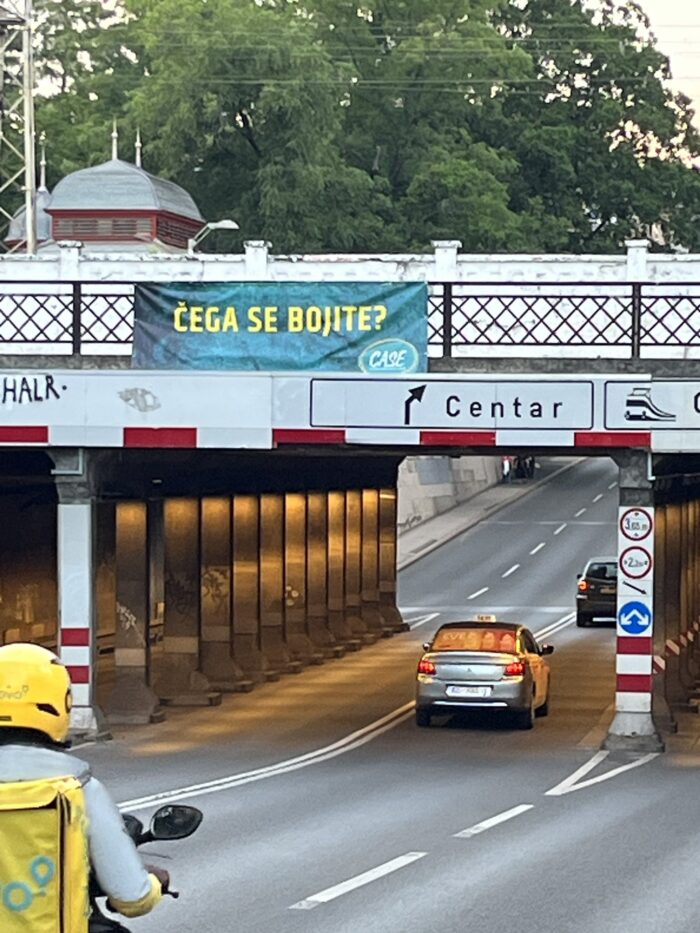
The Croatian Journalists’ Association and its partners, the Trad Union of Croatian Journalists and the Green Action, in front of the Ministry of Administration and Justice in Zagreb, warned of the dangerous withdrawal of EU members from essential documents to protect journalistic freedoms. HND President Hrvoje Zovko assessed that the Government of the Republic of Croatia took a worrisome position on the Anti-SLAPP Directive because it favoured a significantly “watered down” approach that does not offer a practical framework for stopping SLAPP lawsuits. 
The purpose of regulating SLAPP (Strategic Lawsuits Against Public Participation) is to deter plaintiffs and shorten court proceedings to last only as long as necessary for the court to determine that it is SLAPP. Representatives of HND, SNH, and Green Action unfurled the banner “What are you afraid of?” in front of the Ministry. They submitted a letter to the Minister of Justice and Administration, Ivan Malenica, expressing concern with the position taken by the Government of the Republic of Croatia at the EU Council meeting and the changes proposed by the Council in the text of the Anti-SLAPP Directive of the European Commission. Read the letter here. 
HND President Hrvoje Zovko said that SLAPP lawsuits attack freedom of speech. Through them, local and national politicians, businesspeople, and judges persecute journalists in litigation and criminal proceedings. Unfortunately, from the perspective of SLAPP lawsuits, Croatia is the worst member state in the European Union. 
– For five years, we have only heard promises and promises. The Government of the Republic of Croatia is declaratively in favour of a solution. A Working Group was established in the Ministry of Culture and Media that deals with SLAPP lawsuits, and in which we have our representatives, but we need more. For the past five years, HND has been surveying the number of cases, many of which are also SLAPP lawsuits, and we will never deviate even a millimetre from our demand, which is the decriminalization of all criminal offences against honour and reputation. We believe that civil law allows everyone injured to claim their rights there, said Zovko.
He added that although there are no significant obstacles in the Croatian legal system for the introduction of minimum standards that would protect journalists and other SLAPP targets from pending litigation, the Government has sided with the general approach of the Council of the EU, which significantly dilutes the proposal of the European Commission and does not offer a practical framework for stopping SLAPPs.
According to the results of the latest HND research on lawsuits for damage to reputation and honour against journalists and the media, 945 lawsuits are active in Croatia, and the longest-running court case has been going on for 33 years.
– SLAPP lawsuits have emerged as a novel means of targeting journalists. Physical violence is no longer necessary: instead, individuals can harass journalists through lawsuits, often seeking exorbitant amounts of monetary compensation, said Zovko, adding that there is no political will on the part of the ruling party to reduce the pressure of SLAPP lawsuits on the journalistic profession.

The president of the European Federation of Journalists (EFJ) and the Union of Croatian Journalists (SNH), Maja Sever, emphasized this is a joint statement of HND, EFJ, and NGOs before the parliamentary session in Strasbourg, where the Anti-SLAPP directive will be discussed.
Over the past month, politicians have increasingly shown a preference for forging stronger connections with publishers rather than journalists, particularly in the context of upcoming elections. We have been following the weakening of documents that protect journalistic freedoms! We are here to warn you; fulfil your promises; What are you afraid of? – said Sever, who believes that no effective framework is offered to stop SLAPP lawsuits because it is intended to limit the scope of the directive to narrowly defined “cross-border” cases, i.e. cases in which criminal prosecution takes place in another EU member state.
For the new “softened” approach, Sever says that it significantly weakens the mechanism of early rejection of the lawsuit by proposing a restrictive definition of “apparently unfounded cases”, cancels the provision on compensation for damages for the targets of SLAPP lawsuits and excludes civil claims initiated in criminal proceedings from the scope of the directive.
At the conference, Enes Ćerimagić, a lawyer from Green Action, spoke about the case of a SLAPP lawsuit against the opponent of the golf course in Srđ.
Hina


